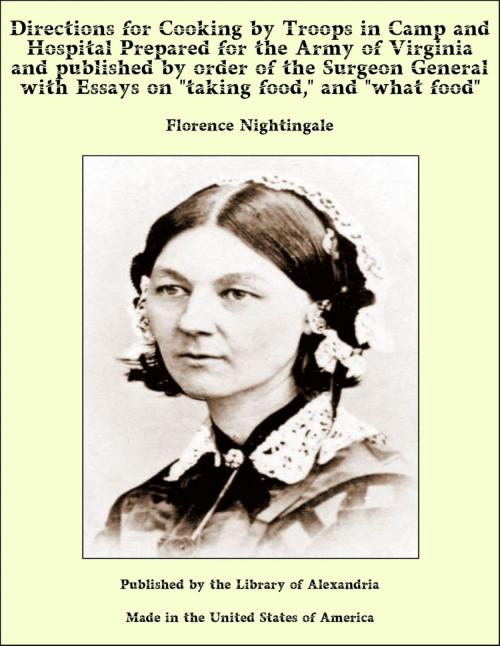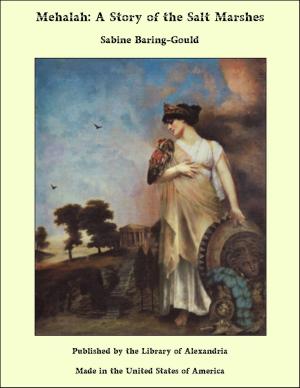Directions for Cooking by Troops in Camp and Hospital Prepared for the Army of Virginia and published by order of the Surgeon General with Essays on "taking food," and "what food"
Nonfiction, Religion & Spirituality, New Age, History, Fiction & Literature| Author: | Florence Nightingale | ISBN: | 9781465609366 |
| Publisher: | Library of Alexandria | Publication: | March 8, 2015 |
| Imprint: | Language: | English |
| Author: | Florence Nightingale |
| ISBN: | 9781465609366 |
| Publisher: | Library of Alexandria |
| Publication: | March 8, 2015 |
| Imprint: | |
| Language: | English |
I will mention one or two of the most common errors among women in charge of sick respecting sick diet.—One is the belief that beef tea is the most nutritive of all articles. Now, just try and boil down a lb. of beef into beef tea, evaporate your beef tea and see what is left of your beef. You will find that there is barely a teaspoonful of solid nourishment to half a pint of water in beef tea; nevertheless there is a certain reparative quality in it, we do not know what, as there is in tea;—but it may safely be given in almost any inflammatory disease, and is as little to be depended upon with the healthy or convalescent where much nourishment is required. Again, it is an ever ready saw that an egg is equivalent to a lb. of meat,—whereas it is not at all so. Also, it is seldom noticed with how many patients, particularly of nervous or bilious temperament, eggs disagree. All puddings made with eggs, are distasteful to them in consequence. An egg, whipped up with wine, is often the only form in which they can take this kind of nourishment. Again, if the patient has attained to eating meat, it is supposed that to give him meat is the only thing needful for his recovery; whereas scorbutic sores have been actually known to appear among sick persons living in the midst of plenty in England, which could be traced to no other source than this, viz.: that the nurse, depending on meat alone, had allowed the patient to be without vegetables for a considerable time, these latter being so badly cooked that he always left them untouched. Arrow-root is another grand dependence of the nurse. As a vehicle for wine, and as a restorative quickly prepared, it is all very well. But it is nothing but starch and water. Flour is both more nutritive, and less liable to ferment, and is preferable wherever it can be used. Again, milk, and the preparations from milk, are a most important article of food for the sick. Butter is the lightest kind of animal fat, and though it wants the sugar and some of the other elements which there are in milk, yet it is most valuable both in itself and in enabling the patient to eat more bread. Flour, oats, groats, barley, and their kind, are, as we have already said; preferable in all their preparations to all the preparations of arrowroot, sago, tapioca, and their kind. Cream, in many long chronic diseases, is quite irreplaceable by any other article whatever. It seems to act in the same manner as beef tea, and to most it is much easier of digestion than milk. In fact, it seldom disagrees. Cheese is not usually digestible by the sick, but it is pure nourishment for repairing waste; and I have seen sick, and not a few either, whose craving for cheese showed how much it was needed by them.
I will mention one or two of the most common errors among women in charge of sick respecting sick diet.—One is the belief that beef tea is the most nutritive of all articles. Now, just try and boil down a lb. of beef into beef tea, evaporate your beef tea and see what is left of your beef. You will find that there is barely a teaspoonful of solid nourishment to half a pint of water in beef tea; nevertheless there is a certain reparative quality in it, we do not know what, as there is in tea;—but it may safely be given in almost any inflammatory disease, and is as little to be depended upon with the healthy or convalescent where much nourishment is required. Again, it is an ever ready saw that an egg is equivalent to a lb. of meat,—whereas it is not at all so. Also, it is seldom noticed with how many patients, particularly of nervous or bilious temperament, eggs disagree. All puddings made with eggs, are distasteful to them in consequence. An egg, whipped up with wine, is often the only form in which they can take this kind of nourishment. Again, if the patient has attained to eating meat, it is supposed that to give him meat is the only thing needful for his recovery; whereas scorbutic sores have been actually known to appear among sick persons living in the midst of plenty in England, which could be traced to no other source than this, viz.: that the nurse, depending on meat alone, had allowed the patient to be without vegetables for a considerable time, these latter being so badly cooked that he always left them untouched. Arrow-root is another grand dependence of the nurse. As a vehicle for wine, and as a restorative quickly prepared, it is all very well. But it is nothing but starch and water. Flour is both more nutritive, and less liable to ferment, and is preferable wherever it can be used. Again, milk, and the preparations from milk, are a most important article of food for the sick. Butter is the lightest kind of animal fat, and though it wants the sugar and some of the other elements which there are in milk, yet it is most valuable both in itself and in enabling the patient to eat more bread. Flour, oats, groats, barley, and their kind, are, as we have already said; preferable in all their preparations to all the preparations of arrowroot, sago, tapioca, and their kind. Cream, in many long chronic diseases, is quite irreplaceable by any other article whatever. It seems to act in the same manner as beef tea, and to most it is much easier of digestion than milk. In fact, it seldom disagrees. Cheese is not usually digestible by the sick, but it is pure nourishment for repairing waste; and I have seen sick, and not a few either, whose craving for cheese showed how much it was needed by them.















